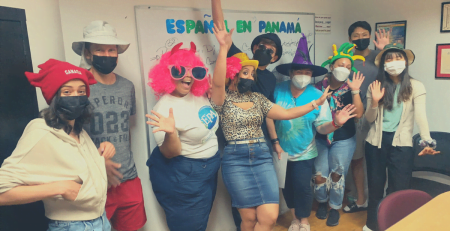Why Learning Spanish in Panama Matters for Workers
In today’s interconnected world, speaking more than one language can be a game-changer, especially in a diverse and vibrant country like Panama, where Spanish is not just a language but a cultural bridge. In this blog, we’ll delve into the pivotal reasons why learning Spanish is not only beneficial but essential for workers in Panama, and how it can significantly impact both their professional trajectories and personal lives.
1. More Job Opportunities:
Panama’s booming economy and its strategic location as a global business hub attract companies from various industries, creating a wealth of job opportunities. However, many of these opportunities require proficiency in Spanish. Whether it’s communicating with clients, collaborating with colleagues, or understanding workplace protocols, a solid grasp of Spanish can open doors to a broader array of job prospects. In sectors like tourism, hospitality, and customer service, where interaction with Spanish-speaking clients is frequent, fluency in Spanish is often a prerequisite for employment. Thus, investing in Spanish language skills can significantly enhance a worker’s employability and career advancement prospects. Getting a Job in Panama
2. Fit in Better:
Beyond the professional realm, learning Spanish fosters a deeper connection with Panama’s rich cultural tapestry and facilitates smoother integration into the local community. Language is not just a means of communication but also a gateway to understanding and embracing cultural nuances. By learning Spanish, workers demonstrate respect for Panama’s culture and traditions, making them feel more welcome and accepted. This sense of belonging enhances workplace morale, encourages teamwork, and strengthens bonds with colleagues and neighbors alike.

3. Better Communication, Better Work:
Effective communication is the cornerstone of any successful workplace. In Panama’s diverse workforce, where individuals from different linguistic backgrounds converge, the ability to communicate fluently in Spanish is invaluable. Clear communication minimizes misunderstandings, fosters collaboration, and ensures tasks are completed efficiently and accurately. Moreover, bilingual workers have a distinct advantage in bridging communication gaps between Spanish-speaking and non-Spanish-speaking counterparts, facilitating smoother workflow and enhancing overall productivity. How to Build Your Spanish Vocabulary.
4. Serve Customers Better:
In industries such as tourism, retail, and hospitality, where customer interaction is paramount, speaking Spanish is not just advantageous but essential. Panama’s thriving tourism sector, in particular, attracts visitors from Spanish-speaking countries worldwide. Being able to converse with customers in their native language creates a personalized and welcoming experience, fostering customer satisfaction and loyalty. Businesses that prioritize Spanish language training for their employees not only enhance customer service standards but also gain a competitive edge in attracting and retaining clientele.
In essence, supporting workers in learning Spanish isn’t just an investment in their individual growth but also in the prosperity of businesses and communities in Panama. At EPA – Español en Panama, we’re dedicated to empowering workers with the linguistic skills they need to thrive in the dynamic Panamanian landscape. By equipping workers with Spanish proficiency, we aim to facilitate their professional success and foster a more inclusive and interconnected society.






